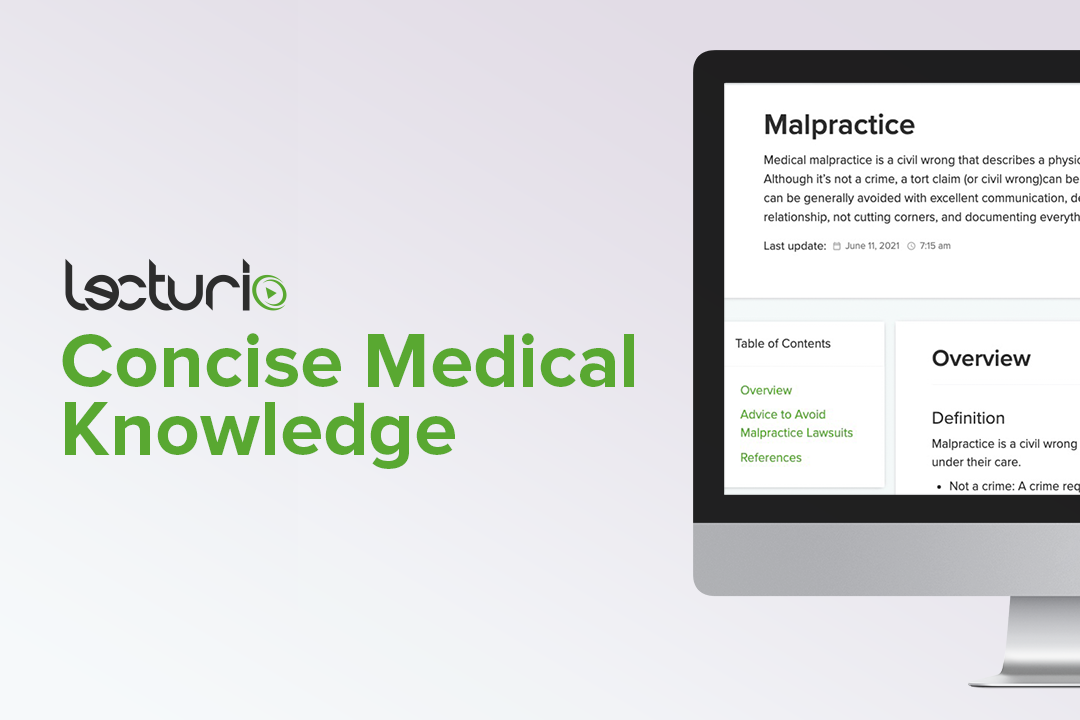Playlist
Show Playlist
Hide Playlist
Introduction to Medical Errors
-
Slides Introduction to Medical Errors.pdf
-
Download Lecture Overview
00:01 The topic of medical errors is a very crucial one when we talk about the ethical practice of medicine. 00:07 Medical errors will happen to all clinicians. 00:10 And how we deal with these both honestly and with compassion in disclosure is essential to how we practice our craft. 00:20 Medical negligence is a very specific term and its strict legal definition is jurisdiction specific. 00:26 Medical negligence is an act where there has been a clear deviation from the standard of practice. 00:33 This is a separate topic and as mentioned, is very distinct between different jurisdictions. 00:40 Medical errors, however, these are some things that have been looked at very closely and particularly how medical errors are evolving in terms of their cause of patient's morbidity and mortality. 00:52 So patient safety experts at Johns Hopkins University have calculated that more than a quarter million deaths per year in the United States are caused by medical errors specifically. 01:04 In 2013, the Centers for Disease Control or CDC ranked the top three causes of death as heart disease, cancer and respiratory disease. 01:16 Just three years later, this same group of researchers found that medical errors had now replaced respiratory disease as the third leading cause of death. 01:25 This is very sobering and involves taking a deeper look at this issue on how we might best address it. 01:32 I'd like to talk about four different distinct categories of medical errors. 01:37 They will be first, diagnostic in nature. 01:41 What are some examples of diagnostic medical errors? An error in the delay or the diagnosis of a condition. 01:48 The failure to employ an indicated test to assess a condition. 01:53 The use of an outmoded test or therapy, in other words, not keeping current with current medical knowledge, and the failure to recognize results of monitoring or testing. 02:03 As we say, if you order a test, check the results. 02:07 The second major category I'd like to discuss is that of treatment medical errors. 02:12 Some of these are self-evident, for example, the error in the performance of an operation or procedure or a test. 02:19 An error in administering medical treatment in other way. 02:23 In other words, not just do we do the test or do we do the treatment, but how do we carry out a given treatments. 02:30 The third of these is an error in the dose or the method of using a drug and this is a very common one, either using an inappropriate medication or using the incorrect dose of the medication which can be very harmful. 02:43 And avoidable delay in a treatment or in responding to an abnormal test. 02:47 So promptness is very important in avoiding medical errors. 02:51 And then finally, in this category, an inappropriate or not indicated care, something that is off label and not disclosed to the patient, or it's completely inappropriate for a given condition. 03:04 A third major category and examples of medical errors is that of those that are preventive in nature. 03:10 So one of these examples is a failure to provide prophylactic treatment. 03:15 Giving somebody, for example, a medication when they are about to travel to a country that has a particular disease which is very prevalent. 03:22 This prophylaxis is very important for travelers, but if not given, this would be considered a medical error. 03:29 Inadequate monitoring or follow up of treatment. 03:31 Once again, getting back to the concept that if we order a test or an x-ray, and we don't follow up, that falls within the realm of medical errors. 03:40 Other broad examples of medical errors would include failure of communication. 03:44 This is very important. 03:45 How we communicate within a hospital or between hospitals is essential for maintaining good patient care. 03:52 Equipment failure. 03:53 When things break that are supposed to work, this can cause an obvious problem. 03:58 If we're not doing appropriate maintenance checks of equipment, this would also constitute an equipment error. 04:04 And then finally, any other system failure. 04:06 This could be IT. 04:08 This could be information dissemination. 04:10 This could be anything within the context of a given healthcare system. 04:14 These are all examples of preventable medical errors.
About the Lecture
The lecture Introduction to Medical Errors by Michael Erdek, MD, MA is from the course Medical Errors.
Included Quiz Questions
Which of the following statements accurately distinguishes medical negligence from medical error?
- Medical negligence is a failure to meet a reasonable standard of care, while medical error is an unintended mistake that may or may not constitute negligence.
- Medical negligence occurs only in cases of intentional harm, while medical error is accidental.
- A medical error involves only a mistake made during diagnosis, while medical negligence may involve a mistake in treatment.
- Medical negligence can be excused if the healthcare provider acted in good faith, while medical error is always considered negligent.
- Medical negligence involves a mistake in judgment, while medical error involves a mistake in the procedure.
What are the four categories of medical errors?
- Diagnostic errors, treatment errors, preventable errors, and communication errors
- Treatment errors, surgical errors, billing errors, and documentation errors
- Medication errors, surgical errors, diagnostic errors, and communication errors
- Treatment errors, medication errors, billing errors, and communication errors
- Diagnostic errors, surgical errors, medication errors, and documentation errors
Customer reviews
5,0 of 5 stars
| 5 Stars |
|
5 |
| 4 Stars |
|
0 |
| 3 Stars |
|
0 |
| 2 Stars |
|
0 |
| 1 Star |
|
0 |




